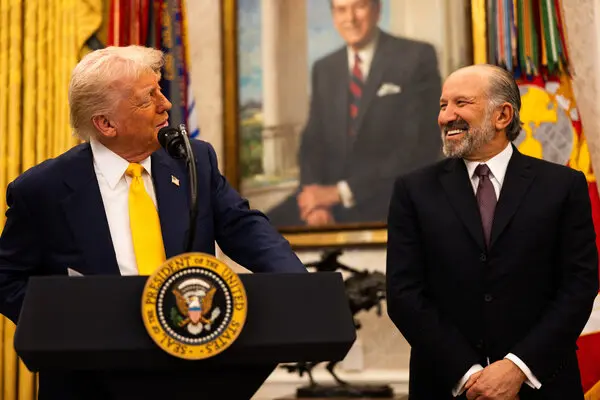Commerce Secretary Lutnick Says US to Publish GDP Stats on Blockchain

During a recent cabinet meeting at the White House, US Commerce Secretary Howard Lutnick outlined new plans for the Department of Commerce to integrate blockchain into its data publication processes. Addressing President Donald Trump directly, Lutnick highlighted the initiative as a step forward in recognizing the president’s support for cryptocurrency. He stated that the department would begin issuing its statistics on the blockchain, including key metrics like GDP, to enable broader data distribution. This development comes amid growing interest in blockchain’s role within government operations and reflects ongoing efforts to modernize economic reporting.
Lutnick explained that the move would make these statistics available across the entire government, allowing other agencies to adopt similar practices once details are finalized. The announcement underscores a broader shift in how federal entities view blockchain, positioning it as a tool for secure and efficient data handling. Officials are currently working through the remaining technical aspects to ensure a smooth rollout in the near future.
This initiative builds on earlier discussions within the Trump administration about embracing digital assets and related technologies. Back in April, Lutnick had shared a vision for treating Bitcoin as a commodity akin to gold in economic calculations, including those by the Bureau of Economic Analysis for national accounts. Now, with this latest update, the Commerce Department appears ready to put those ideas into action, starting with core economic indicators.
In a meeting with President Donald Trump, Secretary Howard Lutnick said the U.S. Commerce Department will start releasing GDP statistics and data on the blockchain. pic.twitter.com/hLPh12UlNF
— Bitcoin & Crypto Alerts 🚨 (@bitcoinxalerts) August 26, 2025
Government Embrace of Blockchain
The decision to publish data on the blockchain aligns with the Deploying American Blockchains Act of 2025, which promotes the use of this technology for enhancing transparency in government reporting. By leveraging blockchain’s immutable nature, the department aims to reduce the risk of data tampering and provide verifiable information to the public. This approach could set a standard for other sectors, encouraging wider adoption of decentralized systems in handling sensitive economic details.
Businesses and investors in the crypto space stand to gain from access to official data distributed via blockchain, which offers a reliable source for tracking industry trends. For instance, GDP figures published this way would allow for real-time verification, aiding in more accurate market analyses. Lutnick’s comments during the meeting emphasized the potential for this to support data-driven decisions across industries.
The initiative also ties into a presidential executive order from January 2025 on digital financial technologies, which called for a regulatory framework to guide such innovations. As part of this, advisory committees are being formed to standardize blockchain protocols, addressing issues like interoperability that have hindered broader implementation. With blockchain infrastructure spending projected to surge in the coming years, this government step could accelerate investments in related tools, services, and networks.
Crypto enthusiasts and financial experts have welcomed the news, seeing it as a signal of the administration’s commitment to fostering innovation. Lutnick referred to Trump as the “crypto president” in his remarks, highlighting how this aligns with policies aimed at making the US a hub for digital assets. Such recognition may encourage more companies to explore blockchain applications, from supply chain management to financial transactions.
As the details are finalized, stakeholders anticipate that this will lead to more informed policy decisions around cryptocurrency regulation. The Commerce Department’s move could inspire similar efforts in other federal agencies, creating a unified approach to data management. Overall, this represents a practical application of blockchain that extends beyond speculation into everyday economic governance.
More Bitcoin and Crypto News:
- U.S. Dominates Bitcoin Hashrate With Over 40 Control
- Quantum Computing Looms As Future Threat To Bitcoin Security Says Tether Ceo Paolo Ardoino
- American Tourist Has 123K In Bitcoin And Xrp Stolen By Fake Uber In London
- FBI Issues Alert About North Korean Hackers In Relation To 1 5 Billion Bybit Hack
- Justin Sun Files Lawsuit Against Bloomberg Over Crypto Holdings Disclosure

